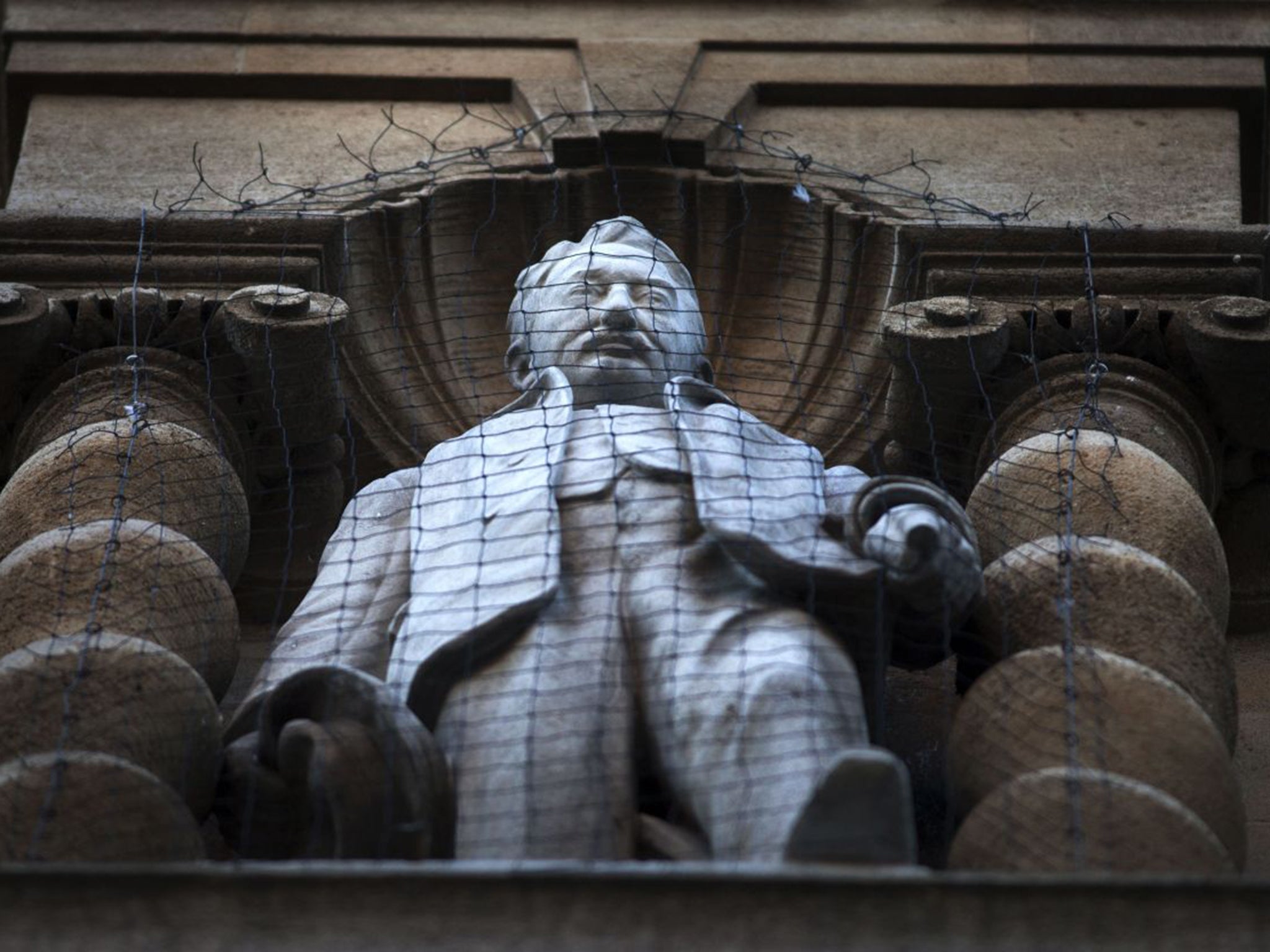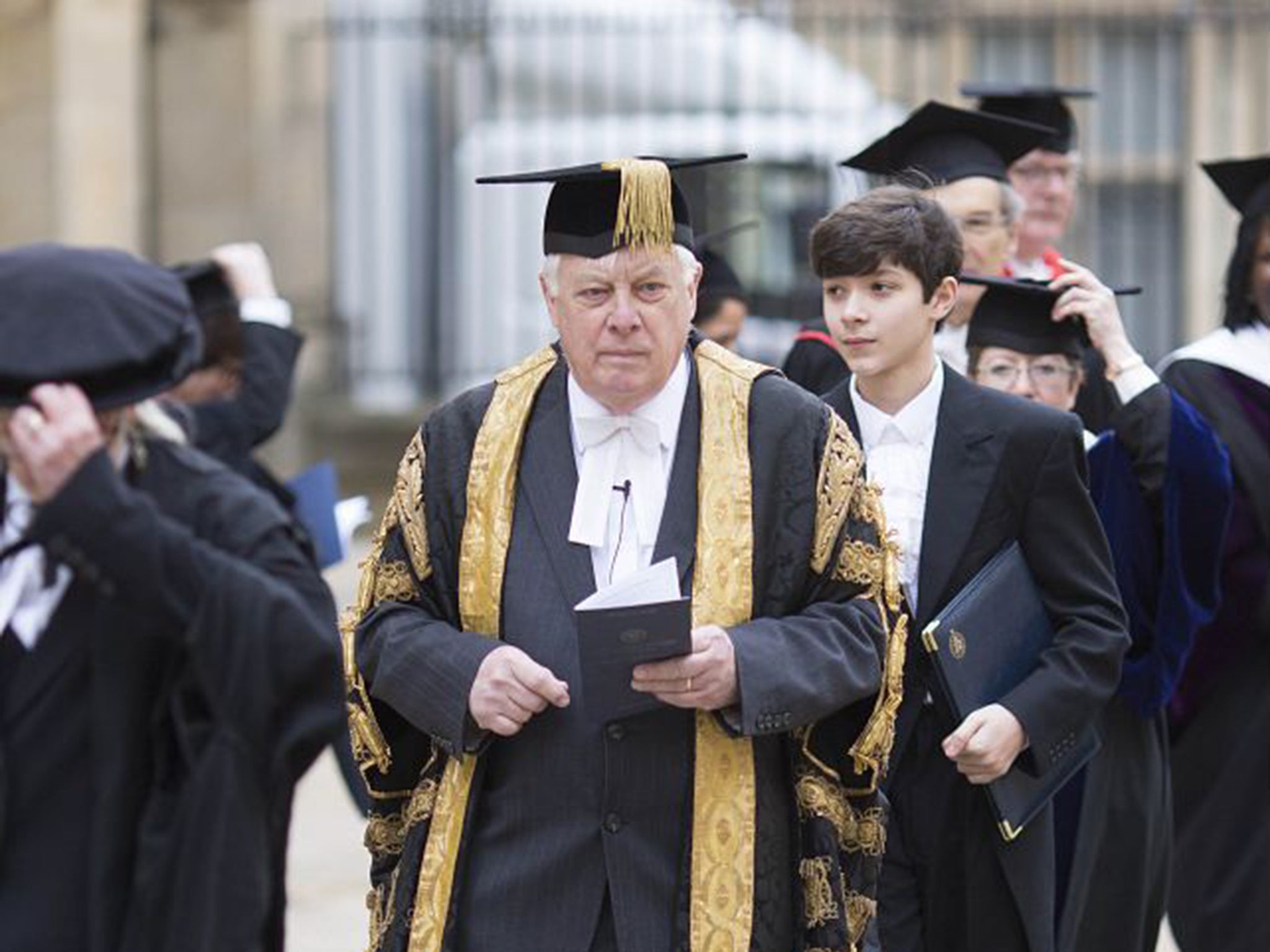Cecil Rhodes protest: Just who would benefit from the Oxford University benefactor's statue being taken down?
Oxford students should know it’s meaningless to judge the past through the prism of our own morality

The University of Oxford’s Cecil Rhodes row, simmering away nicely for the past fortnight or so, was brought back to boiling point last week by a speech from the institution’s chancellor, the former Conservative Party chairman, Lord Patten. Students of the controversy may remember that certain Oxford students are calling for the removal of a statue of Rhodes – a great 19th-century benefactor who doubled up as the architect of South African apartheid – on the grounds that he was a racist and imperialist. There has also been a temporising suggestion that the statue, parked at Oriel College, may be retained but supplemented by a plaque explaining to passers-by how conspicuously short Rhodes falls of contemporary moral yardsticks.
Lord Patten, about whom there is, as a Victorian novelist might say, none of your light nonsense, was clearly not in a conciliatory mood. Speaking at a ceremony to install Professor Louise Richardson as Oxford’s first female vice-chancellor, he defended the relationship with Rhodes and remarked that the university’s history was “not a blank page on which we can write our own version of what it should have been according to contemporary views and prejudices”. He added: “We should not be harried into ill-considered actions… actions, moreover, which may cast doubt on the ability of some who study here to gain a place at this university on their own merits.”
The second sentence is, you imagine, a coded reference to the student activist who claimed that Rhodes was South Africa’s Hitler, and Lord Patten’s implication in making it a hint that people who make sweeping historical comparisons of this kind might want to start off by doing a little elementary research. Naturally, the Oxford spat is fascinating for what it tells us about 21st-century attitudes to Cecil Rhodes and his legacy, but it is even more fascinating for what it tells us about 21st-century attitudes to the past – a seething mass of opinion, it might be argued, in the centre of which two contradictory attitudes do battle with each other. One of them, held by Lord Patten, argues that history, however tarnished to a modern gaze, should at least be allowed to have a life of its own. The other is at all times keen to impose modern judgements on past time.
Curiously, the idea that we could appease our consciences about Rhodes’s part in the history of late-Victorian southern Africa by putting up a sign itemising some of the things he had done wrong reminded me of a visit my wife and I paid in the summer to the Swedish History Museum in Stockholm. It is a wonderful building, exquisitely designed, imaginatively laid out, crammed with eye-catching material, and these particular English visitors walked around it in a state of deep discomfort. The discomfort lay in the fact that virtually every artefact came accompanied by a rather censorious caption, explaining the historical context from the angle of modern social democratic orthodoxy.

A set of tableware from the medieval period? This, we learned, dated from a time when ordinary Swedes were being greatly oppressed by the nobility… And so it went on, to the point where one could barely gaze at a 19th-century handkerchief without being lectured on conditions in the Swedish handkerchief factories and the misery of the people who laboured in them. None of which is to ignore the fact that medieval Swedish noblemen probably did oppress their bondsmen and women, or that a 19th-century factory was a thing of horror, merely to say that this kind of information is patronising in the extreme, that it attempts to form the onlookers’ judgements for them and, in lecturing the past on its own shortcomings, ends up treating it with something very like contempt.
As for the emotion that lies at its core, this, you sometimes feel, is not so much a high-minded disdain for a group of people who did not, alas, possess some of our advantages, as a kind of squeamishness; a refusal to concede that the past, however much we may deplore the fact, was not like now; that most of the individuals who wandered around in it had plausible reasons for behaving as they did; and that, while we may not sometimes like how they behaved, our task as their descendants is to attempt – however sketchily – to see them on their terms as well as through the more exacting prism of contemporary morality.
A good test of where you stand on this is to look at the “lost” second verse of the national anthem, with its lines about frustrating the knavish tricks of the country’s enemies and confounding their politics – barbarism, from the vantage point of 2016. Yet, surely, even now, wouldn’t most Britons want their country’s enemies frustrated and confounded? This one certainly would.
The difficulty in this approach, of course, is that it involves admitting truths about ourselves, or about humankind in general, that we may very well not want to hear. To start seriously examining some of the implications of slavery, for example – a subject still capable of provoking demands for apologies and reparations – is to draw practically everyone into its net: that beacon of liberal enlightenment William Gladstone, whose first parliamentary speech involved a defence of his family’s plantation interests; George Orwell, whose ancestor the Earl of Westmorland benefited from the slave trade and whose wealth, trickling down to his heirs, was undeniably tainted; and numberless West African potentates who did deals with slave traders and happily connived in trafficking their own citizens across the Atlantic.
It is the same with, let us say, the opening up of America in the mid-19th century. Admirers and annotators of Laura Ingalls Wilder’s series of “Little House” books, which follow the adventures of Pa and Ma Ingalls and their brood of daughters through Kansas and the Dakotas in the 1870s generally turn very nervous at the point where native Americans enter the story, for it is a fact that the scrupulous, God-fearing, moral and otherwise kindly Ma “hated the Indians”. But however dreadful this may seem to a modern sensibility, so would any 19th-century descendant of Scottish Presbyterians who fetched up in the American Midwest. Ma thinks the Indians dirty and idle and wonders why they can’t settle down and farm land like the hard-working entrepreneurial newcomers, 99 per cent of whom would have shared her view.
To turn even closer to home, my father (born 1921), who spent five years in the RAF fighting the Nazis, used to say that, had he been born in Hamburg rather than in Norwich, he would certainly as a teenager have joined the Hitler Youth, on the grounds that, back in the 1930s, to a boy hot for diversion and a social life, it would have looked like a slightly more politicised version of the Boy Scouts. I don’t think this meant that my father had any fascist sympathies. Rather, that he knew that he was a child of his time and that, had the tide of that time flowed in a particular direction, he would probably have gone along for the ride.
To return to Cecil Rhodes and the question of the statue erected in his honour at Oriel College, Oxford, it is worth asking just who or what would benefit from having it taken down or captioned with some disapproving remarks. The answer, you fear, is neither the history of which he was a part or the descendants of the people he exploited, but the moral sensibilities of the 21st-century activists protesting about him. But you don’t engage with past time to feel good about yourself or to loftily pronounce that Rhodes, or sweet, good-natured Ma Ingalls, was a “bad person”. You do so to make sense of it and gain an understanding of it. These tasks are rarely accomplished by overturning statues or lecturing museum visitors on the iniquities of long-dead Swedish aristocrats.
Join our commenting forum
Join thought-provoking conversations, follow other Independent readers and see their replies
Comments
Bookmark popover
Removed from bookmarks